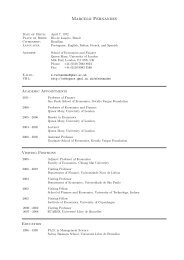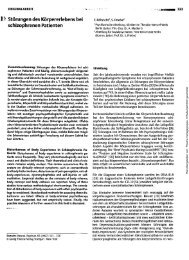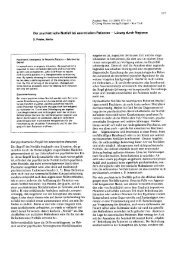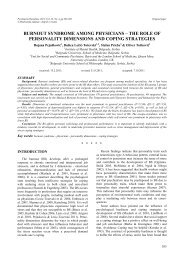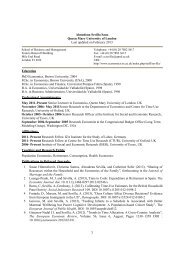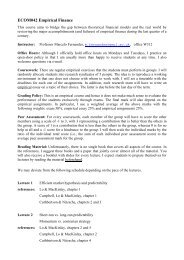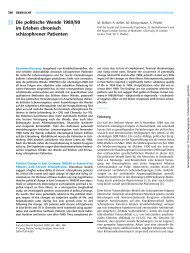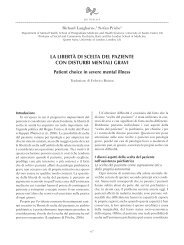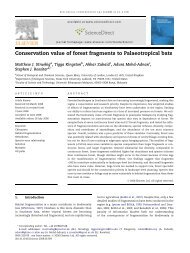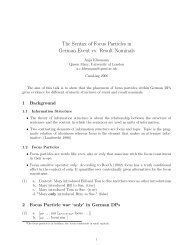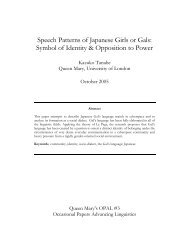Proofs - Personal Webspace for QMUL - Queen Mary, University of ...
Proofs - Personal Webspace for QMUL - Queen Mary, University of ...
Proofs - Personal Webspace for QMUL - Queen Mary, University of ...
You also want an ePaper? Increase the reach of your titles
YUMPU automatically turns print PDFs into web optimized ePapers that Google loves.
S18 Z. Bromand et al. / European Psychiatry 27 (2012) / supplement n°2 / S17-S21<br />
strain. However, to date, there are few studies to identify risk<br />
and protective factors in migrant populations in Europe. In the<br />
current study, we explored both risk factors (neuroticism, social<br />
strain) and protective factors (self- effi cacy, extraversion, and<br />
social support), associated with mental health status among<br />
Turkish women living in Germany.<br />
1.1. Psychological factors in regard to mental disorders<br />
<strong>Personal</strong>ity traits [7,46], perceived self- effi cacy [43,49], social<br />
support, and social stress, especially resulting from violence within<br />
the family [4,21,34,38] are psychosocial contributors to the emergence<br />
<strong>of</strong> mental disorders. There has not been a comprehensive<br />
study about the relationship between social support, self- effi cacy,<br />
and personality factors among migrants <strong>of</strong> Turkish descent.<br />
Research on non- migrant populations points to a signifi cant<br />
correlation between personality traits and psychological complaints<br />
[13,16]. <strong>Personal</strong>ity traits can infl uence health in various<br />
ways, and together with behavior patterns, can either have a<br />
health- promoting or health- threatening effect. Several studies<br />
reveal a positive correlation between the personality trait, neuroticism,<br />
and anxiety and depression [21,34]. Likewise, neuroticism<br />
is a risk factor <strong>for</strong> cultural confl icts. In contrast, extraversion was<br />
found to be a major predictor <strong>of</strong> life satisfaction and less depression<br />
[28,41]. The present study focuses on these two dimensions<br />
<strong>of</strong> personality: neuroticism, and extraversion, as previous fi ndings<br />
suggest they are the best predictors <strong>of</strong> psychological functioning.<br />
Self- effi cacy is regarded as a central protective factor in dealing<br />
with psychological stress [18,48]. Self- effi cacy expectation<br />
refers to the belief that one can achieve goals with one´s own<br />
capability despite potential obstacles. Since people with higher<br />
self- effi cacy expectations are more confi dent about their own<br />
abilities and skills, they can deal with challenges more positively<br />
[5], and achieve success more frequently. Schwarzer [43]<br />
suggests that subjective behavior patterns are available as<br />
resources <strong>for</strong> various situations, and there<strong>for</strong>e self- efficacy<br />
can be seen as a generalised, temporally steady construct. The<br />
self- effi cacy expectation has been found to be an indicator <strong>for</strong><br />
mental health, with low self- effi cacy associated with anxiety and<br />
depression [26,43]. There<strong>for</strong>e, migrants with a higher self- effi cacy<br />
expectation could possibly, despite strain, integrate better in the<br />
host country, and have a lower risk <strong>of</strong> developing psychological<br />
problems.<br />
Social support has been found to be a protective factor in<br />
stressful situations [31]. The quality <strong>of</strong> interpersonal interactions<br />
has a crucial role in social support [31] and social support can<br />
be defi ned as general perceived or anticipated support, i.e. the<br />
subjective conviction about receiving support from one’s social<br />
network in case <strong>of</strong> need [30,45].<br />
Interpersonal interactions can, as well, be experienced as<br />
burdening if one feels controlled, constrained, criticised or<br />
looked down on upon by others [45]. This can lead to confl icts<br />
within the family and increase social strain, which may have<br />
negative effects on mental health. There<strong>for</strong>e we hypothesize a<br />
negative effect <strong>of</strong> social strain on the development <strong>of</strong> psychological<br />
problems amongst migrant women.<br />
To our knowledge, there have been no studies to date, which<br />
have systematically investigated the relationship between<br />
resilience (self- effi cacy, extraversion, social support), risk factors<br />
(neuroticism, social strain) and mental health in women with<br />
Turkish backgrounds living in Germany. We hypothesize that<br />
1) resilience factors (self- effi cacy, extraversion, social support)<br />
would be negatively associated with mental distress and 2) risk<br />
factors such as neuroticism and social strain would correlate<br />
positively with mental distress.<br />
2. Method<br />
2.1. Participants<br />
Participants were recruited through direct contacts with<br />
family members, friends, hospital coworkers and women from<br />
Turkish community centers in Berlin. A total <strong>of</strong> 105 Turkish<br />
migrant women between 21 and 64 years <strong>of</strong> age living in Berlin<br />
were included.<br />
Mother- tongue Turkish clinical staff conducted interviews<br />
with participants to collect sociodemographic data. Participants<br />
completed paper pencil self- report psychological questionnaires<br />
in the presence <strong>of</strong> the mother- tongue Turkish clinical coworkers.<br />
2.2. Setting<br />
The data was collected between April and October 2009. All<br />
participants answered the questionnaire in a setting <strong>of</strong> their own<br />
choice, at home, in the university clinical hospital, or in Turkish<br />
community centers. Written in<strong>for</strong>med consent was obtained<br />
from all participants and the study was approved by the ethics<br />
committee <strong>of</strong> Charité <strong>University</strong>, Berlin, Germany. Respondents<br />
took an average <strong>of</strong> 120 minutes to complete the interview and<br />
questionnaires.<br />
<strong>Pro<strong>of</strong>s</strong><br />
2.3. Measures<br />
2.3.1. Socio demographic variables<br />
Data were collected on age, birthplace <strong>of</strong> the participants,<br />
their parents and grandparents, length <strong>of</strong> stay in Germany,<br />
residence status, reasons <strong>for</strong> migration, language ability,<br />
religious background and several indicators <strong>of</strong> socioeconomic<br />
status (SES) including education (i.e. none, elementary school<br />
or post- secondary education), total family income, partnership<br />
(i.e. single, steady relationship, married or separated), and<br />
employment status.<br />
Furthermore, all respondents were asked to report their<br />
own and their parents’ physical and mental health (e.g. cancer,<br />
diabetes, depression, alcohol addiction, and suicidal ideation or<br />
suicide attempts) and experience <strong>of</strong> trauma.<br />
2.3.2. Translation procedures<br />
Several <strong>of</strong> the instruments (NEO- FFI, Social Strain questionnaire,<br />
Acculturation Scale) were fi rst translated from German<br />
to Turkish and then translated back. Translated questionnaires



